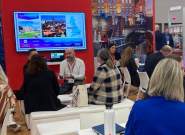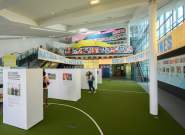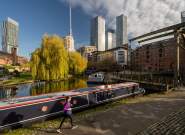Professor of Atmospheric Composition and Director of the Manchester Environmental Research Institute, The University of Manchester
Prof Hugh Coe has been an active member of the Manchester’s Conference Ambassador Programme for many years, and most recently chaired the prestigious Joint International Atmospheric Chemistry Conference 2022.
The iCACGP-IGAC Joint International Atmospheric Chemistry Conference 2022 took place in Manchester 11th-15th September 2022. It incorporated the 17th International Global Atmospheric Chemistry (IGAC) Conference and 15th international Commission on Atmospheric Chemistry and Global Pollution (iCACGP) Quadrennial Symposium.
It is the leading global atmospheric chemistry conference and attracted hundreds of international scientists, industry leaders, and early career researchers from around the world to discuss the latest research in the field of atmospheric chemistry and to debate future challenges.
The conference took place at conference facilities across The University of Manchester, along with an icebreaker reception at Whitworth Art Gallery, a tour of the Science & Industry Museum and a conference banquet at The Monastery.
The Scientific Programme Committee comprised of members of the IGAC and iCACGP Scientific Steering Committees and the Local Organising Committee includes scientists from leading Universities in the north of the UK. An exciting programme spanned air pollution to global change and linked fundamental research to policy development, interfacing atmospheric science with wider biogeochemistry of the Earth System. Major sponsors of the event include the UK National Centre for Atmospheric Sciences, the US National Oceanic and Atmospheric Administration, NASA, the US National Science Foundation, and Copernicus.
Hugh Coe’s research interests focus on quantifying processes responsible for air pollution and effects on regional climate. He has led and participated in numerous large international field studies to study amongst others biomass burning, trans-boundary air pollution, dust in the atmosphere, and the impacts of pollution on the clean background atmosphere. He has led a number of studies to investigate pollution in the UK, China and India and was the PI of a major international collaboration between India and the UK to characterise air pollution across the Indo-Gangetic Plain using international research aircraft. He has led and participated in a number of major UK air quality programmes and currently leads the UKRI CleanAir project OSCA. He has published over 300 peer review papers and has a h index of 69. In 2014 and 2018 he was named as one of the 100 Most Highly Cited Researchers in Geosciences. He is the 2022 recipient of the European Geophysical Union Vilhelm Bjerknes Medal.








